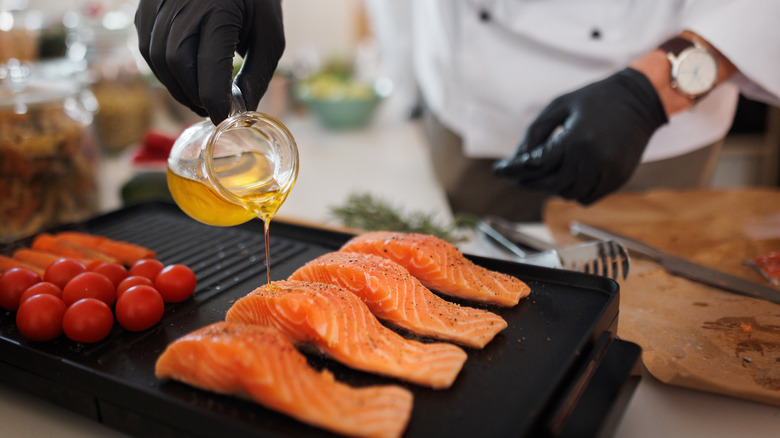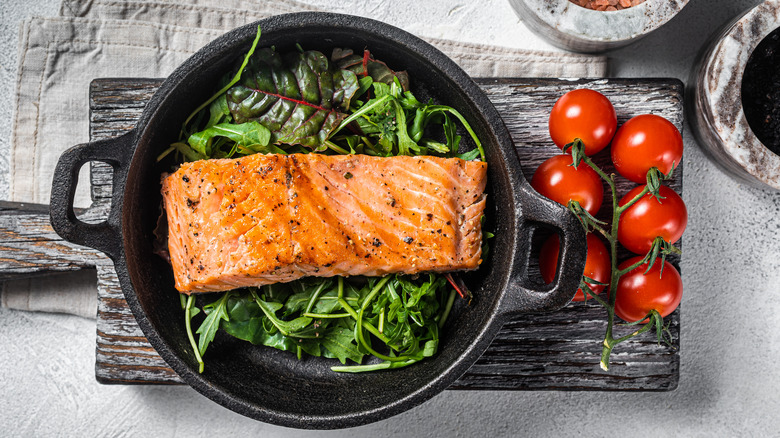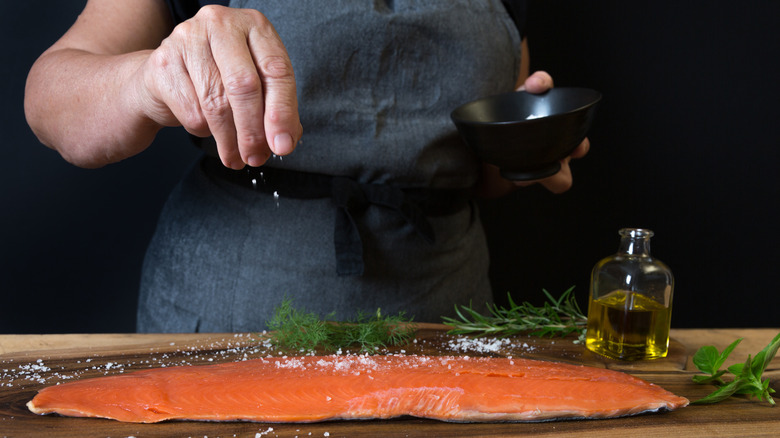You Shouldn't Shy Away From Oil When Cooking Salmon
Slick, meaty, and delicious, salmon is a popular protein that chefs of all levels choose to make as part of a light and easy meal. While it might seem relatively simple to prepare this common fish, it can be deceptively difficult to cook. Even simple mistakes can turn a luxurious cut of salmon into a dry and chewy mess if you're not aware of how to properly heat it up.
Luckily, there are a few easy ways to ensure your salmon comes out perfectly cooked. One such technique to remember is to never skip on one big ingredient: oil. Salmon is already full of natural acids and oils, but it does need a little extra oil to help it cook. Like any dish, salmon needs a little extra fat for that extra moist and flavorful end product to come to life. So pouring plenty of oil into the pan before laying your fish down to cook is key. (Yes, even if you're cooking salmon in your air fryer.)
Why oil is so important for a delicious salmon
No matter how you choose to cook it, salmon is a delicate fish, and you need to be diligent when approaching its heating process. Using enough oil to cook it not only ensures that your fish retains its flavor, and releases more as it cooks, but it also keeps the salmon from sticking to the pan. Fish becomes softer as it heats, and if it sticks to your grill or baking sheet, it can easily pull apart, making for a sad-looking slab rife with imperfections by the time it reaches the plate.
But, if you're worried about over-saturating the fish with fat, there's no need to be. Salmon does not absorb much of the excess oil used to coat a pan. Just look at dishes like salmon confit: To make this meal, you have to poach your salmon in oil. And, instead of the oil being soaked into the fish, it gently surrounds the salmon filets in a blanket of warm fat, which steams its insides until it's perfectly soft and tender.
So, to make some especially mouthwatering salmon, using enough oil is key, and not just for its flavor. For more tips to ensure you achieve the salmon of your dreams, here are a few more things to keep in mind.
Other common mistakes to avoid when cooking salmon
Using enough oil is crucial for the meat of your salmon, but it's just as great for the skin too. Some salmon lovers might overlook the power of this fish's skin, but it keeps the salmon extra moist while it cooks and is also full of flavor. So, to make your salmon's skin shine along with the rest of the filet, remember to pat it dry before cooking and place it skin-side down in the pan so it gets extra crispy. Then your salmon skin will make for a beautiful, crunchy contrast to the soft flesh.
Besides discounting the skin, another common mistake chefs make is overcooking this fish. It doesn't take long for salmon to heat, and the actual time will vary depending on your cooking method. Keep an eye on your salmon as it heats to ensure it retains its structure and color, otherwise, you will end up with a tough and chewy dish. To further avoid this sad reality, also remember to avoid seasoning your fish too early. Adding salt to salmon too soon in the process will dry out the fish, so add your seasonings right before the fish hits the pan to keep it light and moist.
Dehydration is a salmon's worst enemy, and the process can happen quickly. Make sure to add plenty of oil to your pan when cooking and avoid the most common mistakes, and your salmon will end up perfectly moist and delicious.


